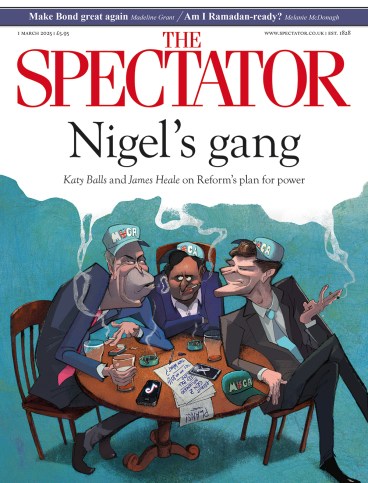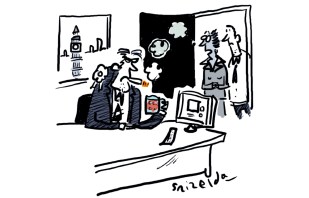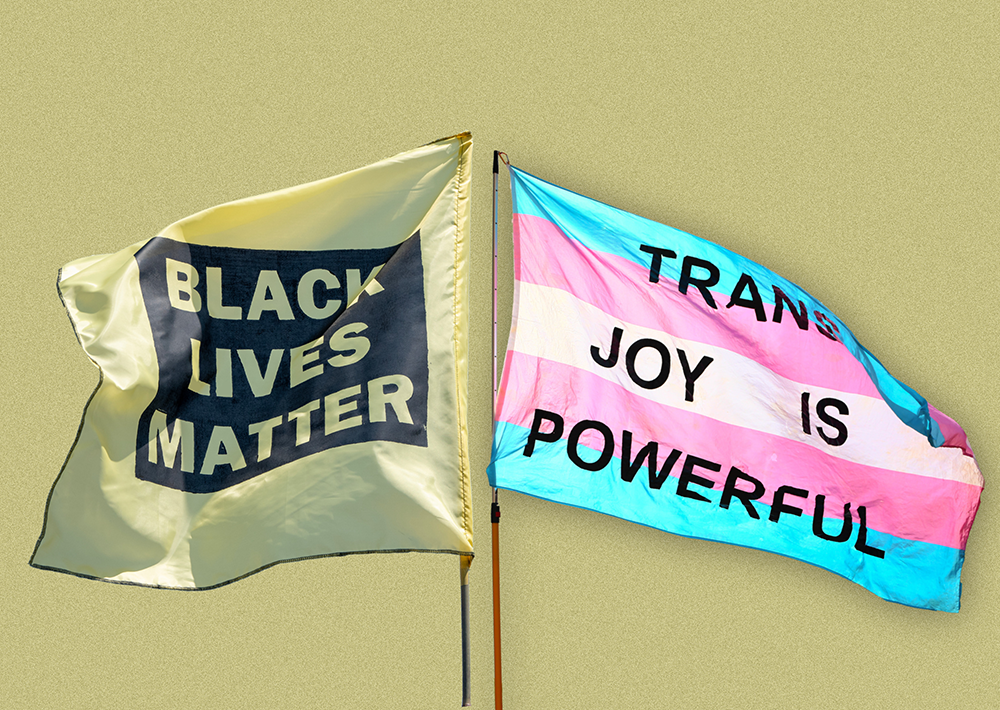
One of the striking aspects of the AfD’s success in the German elections was the party’s popularity among the young, especially men under 25: one in four voted for the hard-right movement. Support for bracingly conservative positions among Gen-Z men isn’t just a German phenomenon, however. In Westminster and beyond, a new breed of young right-wing influencers is seeking to shift our politics. Meet the Zoomer Doomers.
They use acerbic posts to humiliate the defenders of the status quo, in a strategy known as ‘from posting to policy’. Terms such as ‘Boriswave’ – which refers to the net migration figure that spiked at 900,000 under Johnson’s leadership – first appeared within this network. They believe that mass immigration and moronic Tory rule have brought Britain to the brink of collapse.
The movement is fuelled by a feeling that the social contract isn’t working for young people. One Westminster right-winger pointed me to a meme which originated in France: Nick, 30 ans. In the middle of the British version is a young man in a shirt sitting with his head in his hands. Around him are arrows pointing to where his wages are going: to the elderly, via pensions, and the NHS; to Africa via UK Aid Direct; and to Karim, 25, wearing a balaclava, receiving his share of Nick’s cash via the Jobcentre and housing benefit.
‘People in Westminster who are in their twenties and thirties are basically beholden to this ideology,’ says one excitable thinktanker. It’s an exaggeration, but there is a large contingent of disaffected young people in professional politics. Many of the Zoomer Doomers would like to see either the destruction of the Conservatives or a total takeover of the party, akin to the MAGA Republicans. At the centre of this network are hundreds of anonymous X accounts (or ‘anons’), with names such as Lin-Manuel Rwanda, Stakeholder Consultant and Drukpa Kunley. ‘Some anons are disaffected SW1 types, but others are provincial randos,’ an online right-winger tells me.
Drukpa Kunley posts jokes about Napoleon and J.D. Vance taking over the Catholic Church. One of his videos is called ‘The Black British’ and includes pictures of Stormzy, a chicken shop, a young black man being searched by the police and Coventry University. There is no obvious thesis to the video. Instead, it’s impressionistic. You sort of know what he’s saying. Other accounts are much more aggressive. ‘It’s quite similar to what Terfs did on the internet in 2017 and 2018,’ explains one anon. ‘They were very aggressive towards pro trans journalists… Partly it’s winning the argument, but partly it’s bullying.’
Also influential are a handful of blogs, hosted on Substack. J’Accuse mixes parodies of British liberals with rage-filled essays on mass immigration. Pimlico Journal is far more earnest. A recent post explains: ‘Many Pakistanis lack a concept of what rape is… Urdu borrowed the Arabic term Zina-bil-jabr, meaning “fornication by force”.’
Who’s actually in charge of this very online movement? Members are cagey; many only agreed to talk on condition of anonymity. ‘There’s no anon movement in a monolithic sense; there are a series of tendencies jostling for position,’ explains one. Another tells me: ‘Look up Bronze Age Pervert [a respected American anon]. He has this whole thing on leaderless resistance as a way of stopping yourself from being caught by authorities.’ Which makes it sound rather sexy, fomenting revolution.
Acerbic posts are used to humiliate defenders of the status quo: a strategy known as ‘from posting to policy’
This might seem fringe – and a few years ago, it was. But today the online right is increasingly influential in Westminster. Drukpa’s followers include government advisers from both Labour and the Tories; journalists from every major publication; professors from UCL, Oxford and Cambridge; and Rory Stewart.
Some Zoomer Doomers believe their influence is being felt among the brightest Tory MPs. Neil O’Brien writes essays on his Substack about the government’s failure to record the ethnicities of criminals. The newly elected Nick Timothy recently told the House of Commons that 72 per cent of Somalis live in social housing. The anons were ecstatic; that figure was originally credited to an account called Juice8882. Finally, an MP standing up for Nick, 30 ans.
But this relationship is not entirely comfortable. ‘Thralls prostrate themselves, worshipping at the altar of Neil O’Vaccines [O’Brien was a supporter of lockdowns],’ J’accuse recently wrote. ‘As soon as you excitedly quote tweet a Times column for the simple act of acknowledging your existence, you reduce yourself to a dancing monkey for… the people that you are meant to be destroying and replacing.’

Some credit the online right for Robert Jenrick’s stance against the European Convention on Human Rights. He has adopted the imagery of an anon account called Yookay Aesthetics, which posts pictures of things like vape shops and Turkish barbers on English high streets. Jenrick recently filmed himself walking around Birmingham, pointing out large piles of rubbish to a soundtrack of the call to prayer. For a senior Conservative to make such a video would have been unthinkable just a few years ago. Meanwhile the term ‘Boriswave’ appeared in a recent Sunday Times leader article. Posting is starting to shape policy.
A few years ago, I was invited to a secret Zoomer Doomer meeting at an Indian restaurant, with other journalists and thinktankers as well as a former ministerial adviser. We were there to discuss how to use the subject of grooming gangs to shift the debate on immigration. It was the start of a covert operation. I drifted away from the group after the meeting, but it has certainly been effective. Members are delighted with how they managed to reignite the grooming gang debate.
There are other occasional meet-ups, organised by those who sit between SW1 and this online world. It’s often the same kind of people at these things: journalists, researchers and parliamentary assistants. The anons are there, too. One poster turned out to be an overweight Cambridge mathematician with a cartoon of a Japanese girl as his phone background. Odd people. Odd, but increasingly influential.









Comments